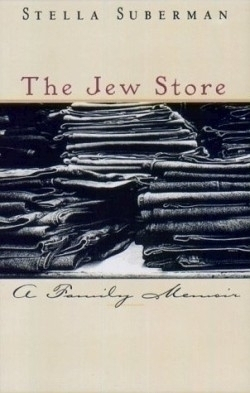
The Jew Store
A Family Memoir
An old Yiddish proverb tells us “alleh shlosser ken men efenen mit a goldenem shlissel”: all locks can be opened with a golden key. What a surprising adventure to read Stella Suberman’s intimate book that unlocks an aspect of immigrant Jewish life in the South left untold—until now.
Suberman recalls her early life in northwest Tennessee in a small town where they were the only Jewish family and the Ku Klux Klan’s influence determined who was welcome—or, at least, tolerated.
Nearly every small southern town in the 1920s had a Jew store—that is what people called it—a modest establishment selling soft goods—clothing and domestics bedding, towels, yard goods—to the poorer people of the town—the farmers, the sharecroppers, the blacks, the factory workers.
Not every immigrant Jew—fleeing pogroms, the Cossacks, the intolerance of centuries—took a liking to the Lower East Side of Manhattan. Aaron Bronson was one of them, disliking the peddler/pushcart life and the city itself. He takes a ship south, hopping off in Savannah, Ga. He is a natural salesman, with an optimistic sense of humor and an innate sense of business tactics.
Not terribly religious, he still feels he should marry a Jewish girl, a scarcity in the South. Always practical, Aaron returns to New York, finds Reba, Suberman’s mother, and eventually, with two children in tow, they move to Nashville, Tenn., a stopover for awhile until Aaron finds a town that needs a Jew store. He is ever the exuberant family man and businessman—while Reba reluctantly leaves the close-knit Jewish family and neighborhood where she feels safe. She desperately misses Jewish names, Jewish food, Jewish talk. While “my father was talking, laughing, being happy, my mother trailed behind. She felt, as she often said, like a shoe run over by many streetcars.”
The author is born two years after the family settles into their new life. Business thrives for her father, while her mother is staunchly set on returning to New York.
This is so much more than a depiction of a time when a small store could thrive. It’s the story of an ebullient and remarkable man and the dramatically differing personalities of his wife and children. It’s the story of how the era of euphoria and plenty ends as the Depression takes hold and chain stores begin a way of merchandising unknown before. With splendid characterization, it reads like a novel with a minute-by-minute crisis. Will Reba prevail in her litany of family needs (a bar mitzvah for her son, Jewish beaus for her two daughters in a town with no other Jewish families)?
The town has finally embraced the family when Aaron agrees to his wife’s insistent pleas to return to crowded apartment house living in the Bronx. The Jew Store exposes ideals that tear families apart—and inevitably hold them together. It takes a close look at the political, economic and societal thinking of the early 20th century. Best, it is a rare golden-key opening to the determinations of survival and how one’s most serious determinations can ruin lives. It is a vivid representation of Jewish life in the South. It is wonderful.
Reviewed by
Hannah Merker
Disclosure: This article is not an endorsement, but a review. The publisher of this book provided free copies of the book to have their book reviewed by a professional reviewer. No fee was paid by the publisher for this review. Foreword Reviews only recommends books that we love. Foreword Magazine, Inc. is disclosing this in accordance with the Federal Trade Commission’s 16 CFR, Part 255.
